Iran Warns People Not To Protest In Esfahan, Ahead Of Planned Gathering
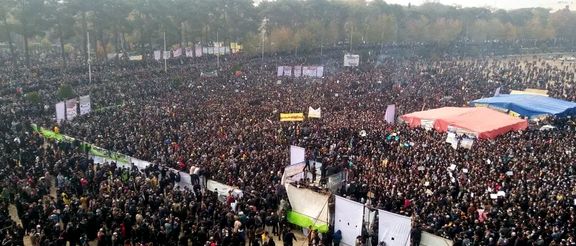
Authorities in Iran’s central city of Esfahan have warned residents not to gather for “any illegal protest” on Friday and threatened to use force.

Authorities in Iran’s central city of Esfahan have warned residents not to gather for “any illegal protest” on Friday and threatened to use force.
Protests by farmers from the regions around the city in November by the government used riot police to disperse them last week from a makeshift camp on the dry riverbed of Zayanbeh Roud in the city center. Farmers were demanding their water share for irrigation.
The following day thousands of residents tried to gather to protest and were met with special riot police who used shotgun ‘bird shots’ to shoot at demonstrators, injuring dozens, including around 20 people who lost one or both eyes.
Residents have called for a repeat protest for Friday, December 3, and the authorities have said that any person protesting would be considered aiding anti-Islamic Republic opposition groups.
The traffic police chief in the city has announced all roads along the river will be closed to cars and pedestrians from 5:00 am on Friday. Esfahan’s governor said no one submitted a request for a permit to protest and any gathering will be illegal.
Islamic Republic officials never issue a permit for any protest deemed to be against the regime.

In a fiery speech Thursday, the commander of Iran’s Quds Force told the United States in case of the slightest move, “your teeth will be crushed in your mouth.”
Esmail Ghaani (Qaani) who was speaking in a gathering to honor those killed in Iran’s operations in the region, said, “We are telling the Americans you have still time to leave the region in humiliation, or you will be expelled in a manner worse than in Afghanistan.”
The Quds (Qods) Force is Iran's extraterritorial military and intelligence army, controlling its proxies in regional countries, distributing weapons cash and military technology to militant groups. Its previous commander Qasem Soleimani was killed in a US drone attack in Baghdad in January 2020.
Praising Afghan militiamen and Iranian forces killed in the region, mainly in the Syrian civil war, Ghaani told “the resistance front” to continue their fight under the banner of Iran’s Supreme Leader Ali Khamenei.
The ‘resistance front’ or ‘resistance forces’ are terms the Islamic Republic uses to refer to its proxy forces, including the Lebanese Hezbollah, Shiite militia it backs in Iraq, forces fighting under its command in Syria, militant Palestinian groups and Yemen’s Houthis.
Ghaani declared that since the time Palestinians followed the “martyrdom” path of Iranians they became more and more powerful. He cited the missile war earlier this year and praised Palestinian militants for firing 3,000 missiles at Israel. He ridiculed Israel that it cannot respond against Iran, claiming that a threat during the 2006 Israeli war against Hezbollah in Lebanon was not carried out.
What sounded as potentially provocative for the region’s Sunni Arab states, Ghaani said that current conditions in the Islamic world are right for the spread of Shiite rule.
He addressed the United States saying, “The time when you did whatever you wished, and no one could say anything is over. The time of hit and run is over. Now if you hit you will be hit back all the way to the end.” He again brought up the US withdrawal from Afghanistan and said, “You fought in Afghanistan for 20 years and what did you accomplish?”. He added that Americans escaped from Afghanistan and could not even evacuate their own people.
Ghanni declared that the US withdrawal from the region has been partly achieved and the ‘resistance front’ will continue its fight.
He concluded by saying, “For years America spoke of overt and covert sanctions, but Iran’s power in hardware and software has reached a level that you know if you make a move “your teeth will be crushed in your mouth.”
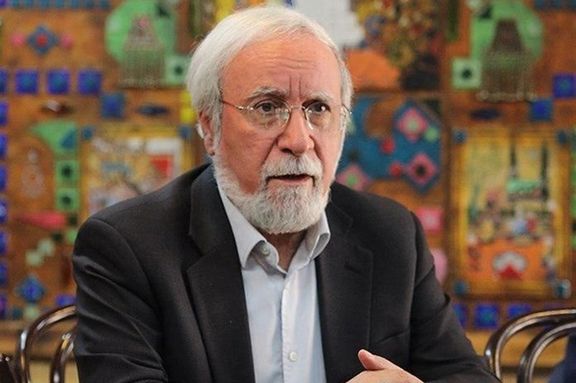
Sabah Zanganeh a former diplomat and a relative of Iran’s Supreme Leader has said in an interview, "The mood is positive, let's talk with America face to face."
This was one of the rare optimistic views coming out of Iran in recent days about the nuclear negotiations in Vienna. Most political analysts are not optimistic about the likelihood of Iran and the United States returning to their commitments under the 2015 nuclear deal known as JCPOA.
Zanganeh, a relative of Supreme Leader Ali Khamenei through marriage, told the reformist Arman newspaper that the general atmosphere in Vienna shows that there is an increasingly positive trend which makes reaching a result more likely. "The fact that the new Iranian negotiators have come to the conclusion that they need to accept the previous six rounds of the nuclear talks as a basis for the current round of talks is a positive step," he said.
The former diplomat added that America's withdrawal from the nuclear deal caused big economic losses for Iran. "There will be more losses if the current situation continues," Zanganeh added that the two sides need to tweak their positions in a way that would lead to the lifting of sanctions imposed on Iran.
Asked if the situation is ripe for lifting the sanctions, Zanganeh said, "There is evidence indicating the Americans have accepted to lift JCPOA-related sanctions. Of course, the priorities for lifting the sanctions have not been determined yet." He added: "On the other hand, it is not clear what would the United States demand against lifting the sanctions and how would Iran react to those demands."
Generally, Zanganeh concluded that based on assessments made about the first two days of the negotiations, reaching results during a short period is likely if the United States and the European countries show goodwill. However, he acknowledged that while the US insists on direct talks with Iran, the Iranian delegation is still adamant that the talks should take place collectively and in the presence of other JCPOA member states.
Meanwhile, he noted that the only country that is against direct talks between Iran and America is Israel, although there might also be opposition among Arab states. The opposition might attempt to obstruct the direct talks, but both Iran and the United States need to tackle possible opposition delicately and not allow pressures from outside to affect the talks.
Zanganeh also noted that Iran has rejected the United States' call for extending some of JCPOA restrictions or imposing new limitations on Iran's nuclear program. He added that Iran will not accept the United States' demand for lowering uranium enrichment level to what was agreed in JCPOA. However, he said that Iran will accept the demand only if a proportionate reduction is made in US sanctions. Tehran also wants the United States and Europe to guarantee that Washington will not leave the agreement again.
Zanganeh also called on Iranian hardliners who have been denying the impact of sanctions on the country’s economy should change their approach and understand the reality that Iranians are calling for lifting economic pressure that has led to hardship for the great majority of the people with ordinary incomes.
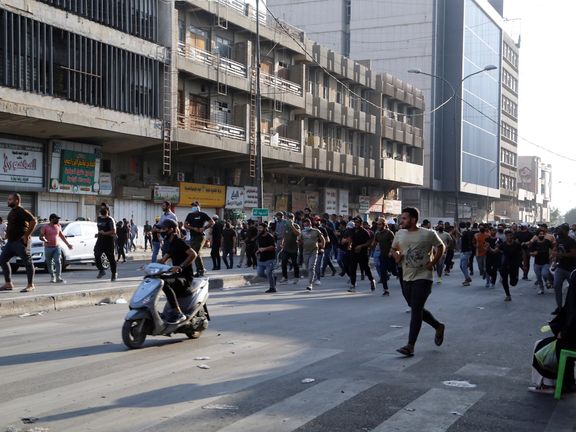
Protesters in Baghdad on Wednesday rejected the final results of Iraq's parliamentary elections, which were announced by the electoral commission a day earlier.
The protesters, mainly supporters of Shiite factions backed by Iran, continued to level unsubstantiated claims that the vote had been rigged.
"We will continue our protest until they change the results and bow to our demands," said protester Ali Jawad.
The electoral commission confirmed Shiite cleric Muqtada al-Sadr as the biggest winner in last month's poll, securing 73 out of Parliament's 329 seats.
A Sunni party headed by Parliament Speaker Mohamed al-Halbousi came in second with 37 seats, while the Kurdistan Democratic Party (KDP) secured 31 seats, the commission said.
The pro-Iran factions - which had alleged voter fraud - lost around two-thirds of their seats. They got only 17 seats, down from 48 in the previous elections.
The results will now be sent to the Federal Supreme Court for ratification, after which the president will call for a Parliament session within 15 days, where a new Speaker is elected.
AP report
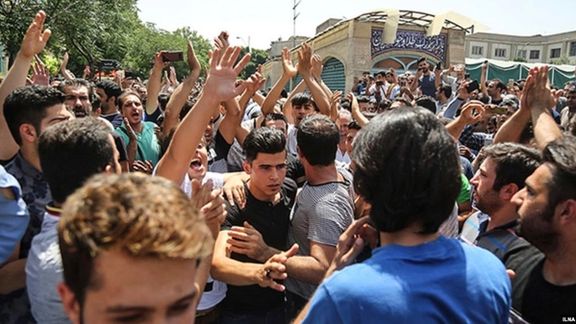
Iran’s Planning and Budget Organization reportedly predicts an eight percent economic growth next year, even if United States’ sanctions remain in place.
Fars news agency close to the Revolutionary Guard reported Wednesday that based on its sources, the Budget Organization believes that two factors will lead to a jump in economic growth in 2022.
First is the huge economic retrenchment Iran has experienced since 2018 when the Trump administration withdrew from the 2015 nuclear agreement, JCPOA, and imposed crippling sanctions. The argument presented is that any country with three years of substantial negative growth is set to rebound. Iran’s economy shrank by around 7-8 percent from 2018-2020. This year, the government says growth has been slightly positive, but inflation, a 50-percent budget deficit and fall in industrial output, for example in steel, tell a different story.
Second, Iranian budget officials believe that the Covid-19 will play a less destructive role in 2022. However, with new variants surfacing every few months, the pandemic is a highly unpredictable economic factor. Even world markets experienced a jolt this week as the Omicron variant raised global alarm.
The big unknown is Iran’s illicit oil exports in the face of US sanctions. On Wednesday oil minister Javad Owji said that exports have substantially increased in the past few months compared with 2020. If this is true, it might provide some foreign currency to the government, but there are so many problems it has to address that a few billion dollars of oil sold clandestinely and cheaply would make a small dent.
It is worth noting that in its 43-year history, the Islamic Republic has had an average economic growth rate of 2 percent.
There is also the question of how the government handles the foreign currency it earns from oil. An economy website in Tehran, Donyae Eghtesad (World of Economy) this week published an analysis that said as long as successive governments used the oil income to defend the rial, an inherently weak national currency instead of real investments, growth has suffered.
The article argued that for a limited period the government should allow the currency to naturally fall against the US dollar to create an equilibrium with the existing 50-percent inflation and resist the temptation of temporarily flooding the market with petrodollars to help the rial. Dollars that the government injects in the foreign currency market is mostly taken out of the country by people and businesses who know that the rial is weak and build their economic egg nests abroad.
The rial has fallen ninefold since 2017, from around 33,000 to the dollar to 290,000. Observed from a 45-year perspective, the rial has fallen more than 4,000-fold. During the monarchy one US dollar was stable at 70 rials.
Donyae Eghtesad also argues that using earned dollars in a wise and responsible manner is half the equation to ensure economic growth. The other side of the coin is economic reform that the Islamic Republic has been reluctant to embrace. The quasi-state-controlled system must be drastically altered, the website says.
But somewhat similar to the Soviet economy, political power in Iran is closely intertwined with economic control by the government. If the government liberalizes the system and losses control over the economy, it will also lose political power.
The best example is the Revolutionary Guard, which is one of the biggest economic players in the country, despite being the main military entity in the country. The regime can hardly survive challenges by angry citizens, if it takes economic power away from the Guards. They have proven time and again that when large protests erupt, they are willing to shoot and kill hundreds to protect the political system.
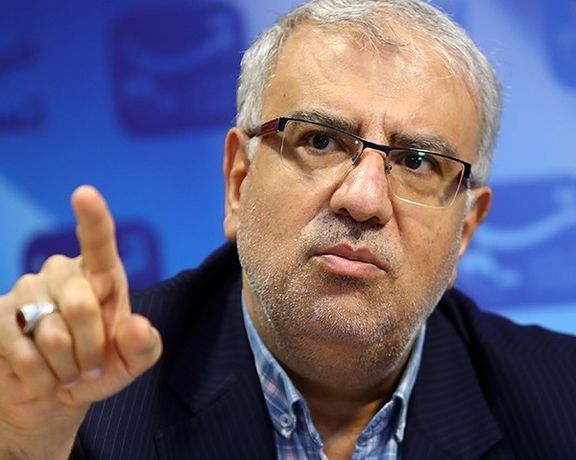
Iran oil minister, Javad Owji said Wednesday that oil exports this year “had impressive growth” compared with last year, despite US sanctions.
Owji was speaking after a joint meeting in parliament between President Ebrahim Raisi, his ministers and lawmakers Wednesday morning. He did not provide any details about the growth in oil exports, as all sales and shipments are conducted in secret for fear of US retaliation against buyers.
Iran’s oil exports dropped from more than 2 million barrels per day in 2016-2017 to less than 200,000 in 2019, after the United States imposed third-party sanctions following its withdrawal from the Obama-era nuclear agreement, the JCPOA.
However, illicit oil exports said to be going mainly to China have increased since September 2020 and provide Iran with an undisclosed amount of revenue. The nature of the illicit trade certainly reduces the amount of foreign currencies Iran can receive. Middlemen who facilitate such shipments make hefty profits and Iran must charge much less than global oil prices to entice buyers.
The Biden Administration, which is indirectly negotiating with Iran to return to the JCPOA, has been criticized for not diligently enforcing the Trump-era sanctions, allowing China to import Iranian oil disguised as originating from other countries.